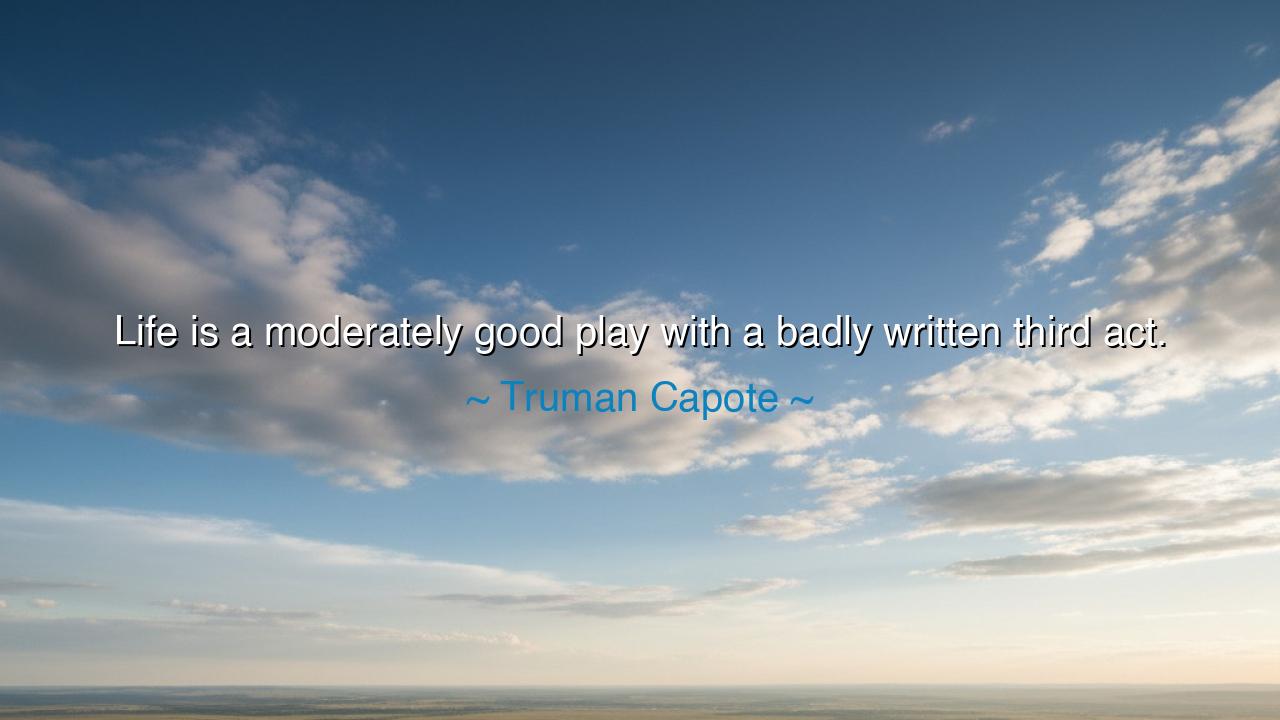
Life is a moderately good play with a badly written third act.






“Life is a moderately good play with a badly written third act.” — thus spoke Truman Capote, the mercurial voice of American letters, whose wit often concealed a sorrowful wisdom. In this single sentence, he captured the tragic comedy of existence — the brilliance of beginnings, the vigor of youth, the triumphs and follies of our middle years — and the slow, stumbling, ungraceful decline that so often follows. Capote, who knew the glamour of success and the darkness of downfall, spoke from the weary heart of experience. His words carry both laughter and lament, for he saw that life, though filled with beauty and meaning, rarely ends as gracefully as it begins.
To the ancients, life was often likened to a drama, written and performed before the eyes of the gods. From the Greek stages of Athens to the philosophical meditations of Rome, the metaphor endured: we are but actors, each given a role by fate, playing our part upon the stage of time. Capote continues this ancient tradition, but with a modern twist of irony. He calls life a “moderately good play” — neither tragedy nor triumph, but a mixture of both, filled with moments of brilliance and scenes of confusion. The first act is youth, sparkling with promise; the second, maturity, where purpose unfolds; but the third — that final descent toward age and death — often loses coherence, as though the playwright himself had grown tired of his creation.
Yet Capote’s observation is not merely cynical. Beneath the sharpness lies a poignant truth: human life resists perfect narrative. We long for meaning, for closure, for the story to end well — but life seldom grants us such symmetry. The plot wanders, the characters fade, and time itself forgets the script. Even the greatest lives — emperors, poets, heroes — end not in grandeur, but in quiet decline. The third act exposes our mortality, our frailty, and our longing for the eternal. It is the reckoning, the unraveling of illusions, the point where all masks must fall.
Think of King Lear, that old monarch of Shakespeare’s world. In his youth, he commanded kingdoms; in his middle years, he tasted pride and power. But in his final act, stripped of title and glory, he wanders the heath, mad and broken, clutching the body of the daughter who loved him most. The story does not resolve with triumph but with truth — that greatness fades, and that love, not dominion, is the soul’s final refuge. So too in Capote’s vision, the last act of life is not about perfection but revelation. We see ourselves as we truly are — flawed, fragile, unfinished.
Capote himself lived this story. In his early years, he dazzled the world with works like Breakfast at Tiffany’s and In Cold Blood, his prose shimmering with elegance and precision. But fame, fortune, and loneliness became his undoing. His third act was one of decline — addiction, estrangement, and despair. And yet, even as his own life frayed, he had the courage to name the truth: that life’s script is never clean, and that imperfection is its most honest mark. In that honesty lies a strange kind of beauty — for a badly written ending is still part of a play that was, at least for a time, magnificent.
The lesson of Capote’s words is not to fear the third act, but to live so vividly in the first and second that even a flawed ending cannot erase their light. The meaning of life is not in its conclusion, but in its unfolding — in the laughter shared, the love given, the work created. We cannot control how the play will end, but we can act our part with grace and courage, knowing that the curtain must fall for all. The great tragedy is not that life’s final act is poorly written, but that we forget to live the earlier ones with joy.
Therefore, dear listener, cherish the scene you are in. Do not wait for perfection, nor despair at its absence. Life’s beauty lies in its impermanence — in the fact that the play is fleeting, yet full of fire. If the third act falters, let it be with dignity, not regret. For even a play that ends imperfectly can still leave the audience moved, inspired, and alive. Capote’s words, though tinged with melancholy, are a reminder to embrace the art of living — to write each day boldly, to speak each line with heart, and to bow at last knowing that, though the ending may stumble, the story itself was worth telling.






AAdministratorAdministrator
Welcome, honored guests. Please leave a comment, we will respond soon